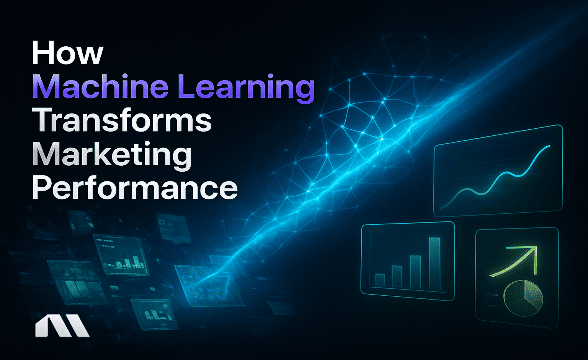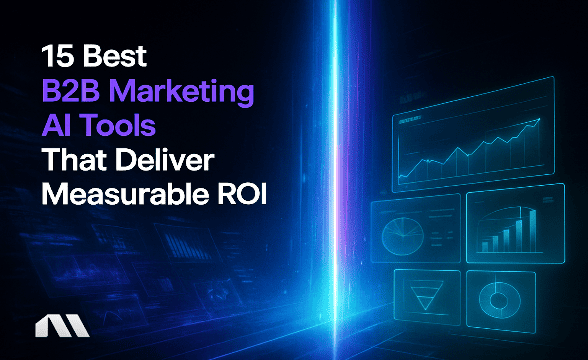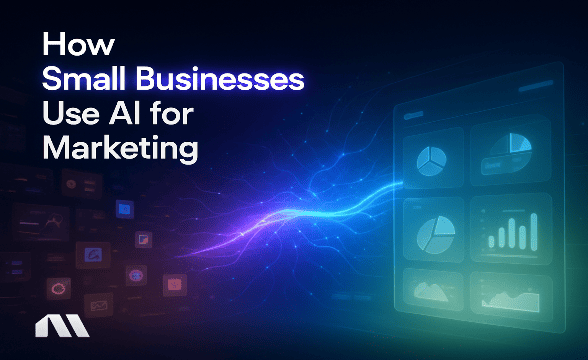Learn how to use AI in digital marketing to automate campaigns, boost ROAS, and save hours daily. Complete implementation guide for e-commerce success.
Picture this: You're spending 4 hours every morning adjusting Facebook ad campaigns, analyzing which creatives are working, and trying to figure out why your ROAS dropped overnight. Meanwhile, your competitor just launched 50 new ad variations, optimized their entire funnel, and increased their profit margins with minimal daily management required.
The secret? They're using AI to streamline what you're doing manually.
And no, this isn't some futuristic fantasy. 88% of digital marketers are already using AI in their day-to-day tasks. Companies implementing AI see 20-30% higher ROI on campaigns compared to traditional methods.
Here's the reality: AI isn't just changing digital marketing - it's completely transforming how e-commerce businesses scale. The question isn't whether you should use AI in digital marketing. It's how quickly you can implement it before your competition leaves you behind.
What You'll Learn
- 5-step AI implementation framework specifically designed for e-commerce scaling
- ROI calculation methods with real performance benchmarks and profit optimization strategies
- Automation setup guide for Facebook/Instagram ads that saves 2+ hours daily
- Creative AI strategies that generate and test winning ad variations automatically
- Bonus: Advanced attribution tracking setup for iOS 14.5+ compliance
Why AI is Essential for E-commerce Marketing Success in 2025
Let's be honest - if you're still manually adjusting bids at 6 AM and creating ad variations one by one, you're fighting yesterday's battle with yesterday's tools. The marketing landscape has shifted dramatically. AI has become the great equalizer that lets small e-commerce businesses compete with enterprise-level efficiency.
What is AI in digital marketing? Artificial Intelligence in digital marketing refers to automated systems that analyze data, predict customer behavior, and optimize campaigns with minimal manual intervention. For e-commerce, this means automated bid adjustments, creative testing, audience targeting, and profit optimization that work around the clock.
Think of it this way: AI continuously monitors performance with minimal oversight required. It analyzes thousands of data points, tests new audiences, adjusts budgets to profitable campaigns, and pauses underperformers. It's like having AI-powered optimization that reduces manual work significantly.
The E-commerce AI Advantage
The numbers don't lie. AI saves marketers an average of 2 hours and 24 minutes daily - that's nearly 900 hours per year you could redirect toward growing your business. But time savings are just the beginning.
Companies using AI see 20-30% higher ROI on campaigns compared to traditional methods. For an e-commerce store spending $10,000 monthly on ads, that's an extra $2,000-$3,000 in profit every single month.
The AI marketing market is valued at $47.32 billion in 2025, growing at 36.6% CAGR. This tells us one thing: this isn't a trend, it's the new standard. Early adopters aren't just getting ahead - they're setting the pace that everyone else will struggle to match.
Pro Tip: The biggest mistake e-commerce owners make is thinking AI is too complex. Modern platforms make AI implementation as simple as connecting your Facebook account. The complexity is handled behind the scenes while you get the results.
The 5-Step AI Implementation Framework for E-commerce
Ready to stop playing catch-up and start leading your market? Here's the exact framework successful e-commerce businesses use to implement AI marketing that actually moves the needle.
Step 1: Audit Your Current Marketing Stack
Before you can optimize with AI, you need to know what you're optimizing. Start by identifying the manual tasks that consume most of your time. Are you spending hours adjusting Facebook campaign budgets? Manually testing ad creatives? Analyzing which audiences perform best?
Calculate your current ROAS and profit margins across all campaigns. This becomes your baseline for measuring AI improvements. Most e-commerce businesses discover they're leaving 20-40% of potential profit on the table through inefficient manual optimization.
Map your customer journey touchpoints from first ad impression to purchase. Understanding this flow helps you identify where AI can have the biggest impact on your bottom line.
Step 2: Choose Your AI Marketing Platform
Here's where most businesses get overwhelmed by options. The key is starting with platforms that integrate seamlessly with your existing tools while providing comprehensive AI capabilities.
Facebook Ads Manager provides basic automated bidding, but it's designed for general advertisers, not e-commerce profit optimization. For serious scaling, you need platforms built specifically for e-commerce businesses.
Madgicx combines AI Meta campaign optimization, creative generation, and profit-focused automation in one platform. Instead of juggling multiple tools, you get comprehensive AI automation designed specifically for e-commerce scaling. The platform performs daily account audits, provides actionable optimization recommendations, and offers one-click implementation of suggested changes.
You can try it for yourself here (for free).
For businesses exploring automated digital marketing solutions, the key is choosing platforms that understand e-commerce metrics like customer lifetime value, profit margins, and inventory considerations.
Step 3: Set Up Automated Campaign Optimization
This is where the magic happens. Connect your data sources including Facebook Pixel, Google Analytics, and your e-commerce platform. The more data your AI has access to, the smarter its optimization decisions become.
Configure AI bidding strategies based on your profit goals, not just conversion volume. Traditional bidding optimizes for conversions, but AI can optimize for profit margins, customer lifetime value, and inventory levels.
Implement automated budget allocation that shifts spend toward profitable campaigns in real-time. Instead of checking performance every morning and manually adjusting budgets, AI monitors performance every few minutes and makes micro-adjustments that compound into significant improvements.
Step 4: Deploy AI Creative Generation and Testing
Creative fatigue kills campaigns faster than any other factor. AI creative generation solves this by continuously producing and testing new variations based on your best-performing content.
Set up automated creative testing frameworks that launch new variations, measure performance, and pause underperformers with minimal intervention. Madgicx's AI Ad Generator creates high-quality, thumb-stopping image ads specifically designed for e-commerce products.
Configure performance-based creative rotation that automatically promotes winning creatives and retires poor performers. This ensures your audience always sees fresh, high-performing content while you focus on strategy rather than execution.
Step 5: Monitor, Measure, and Scale
Establish AI performance benchmarks based on your pre-AI metrics. Track not just ROAS improvements, but time savings, creative testing velocity, and profit optimization.
Set up automated reporting and alerts that notify you of significant changes without requiring constant monitoring. AI should streamline your workload and provide actionable insights.
Plan scaling strategies based on AI insights. As AI identifies your most profitable audiences, products, and creative approaches, use these insights to expand into new markets, launch new products, or increase ad spend with confidence.
AI Tools That Actually Move the Needle for E-commerce
Let's cut through the hype and focus on AI tools that deliver measurable results for e-commerce businesses. Not every AI tool is created equal, and some are better suited for specific business models and growth stages.
Campaign Optimization AI
Facebook Advantage+ provides automated targeting and bidding within Facebook's ecosystem. It's a solid starting point, but it optimizes for Facebook's goals (more ad spend) rather than your profit margins.
Madgicx AI Marketer offers 24/7 campaign optimization with profit focus specifically designed for e-commerce. It performs daily account audits, identifies scaling opportunities, and provides one-click optimization implementation. The platform monitors accounts continuously to help prevent wasted ad spend.
Google Smart Bidding works well for cross-platform automated bidding, especially when combined with Facebook automation for comprehensive coverage.
Creative AI Solutions
Creative production is often the biggest bottleneck for scaling e-commerce advertising. AI creative tools solve this by generating and testing variations faster than any human team.
- Madgicx AI Ad Generator creates e-commerce-specific creative templates that understand product photography, lifestyle imagery, and conversion-focused design principles. It's the world's first LLM AI tool for Meta advertising, designed specifically for e-commerce scaling.
- Canva AI handles design automation for social content and basic advertising needs, though it lacks the e-commerce-specific optimization of specialized platforms.
- Copy.ai generates ad copy and assists with testing variations, particularly useful for businesses running high-volume creative testing.
Analytics and Attribution
Accurate data is the foundation of effective AI optimization. With iOS 14.5+ privacy changes, many e-commerce businesses struggle with attribution gaps that make AI optimization less effective.
- Madgicx Cloud Tracking provides server-side first-party tracking implementation that addresses iOS17 data collection challenges specifically. It improves data alignment between Meta and e-commerce stores, sending accurate conversion data back to Facebook for better optimization.
- Google Analytics 4 offers enhanced e-commerce tracking, though it requires proper setup and doesn't solve iOS attribution challenges on its own.
Pro Tip: Start with one platform like Madgicx that combines multiple AI functions rather than juggling separate tools. Integration complexity often negates the efficiency gains AI is supposed to provide.
ROI Calculation and Performance Benchmarks
Here's the part every e-commerce owner wants to know: what kind of results can you actually expect from AI marketing investments? Let's break down the numbers with real performance benchmarks.
How to Calculate AI Marketing ROI
AI ROI = (Revenue from AI campaigns - AI tool costs - Ad spend) / Total investment × 100
But here's what most guides miss: you need to factor in time savings as well. If AI saves you 2+ hours daily, that's 60+ hours monthly. Value that time at your hourly rate (or what you'd pay a specialist), and suddenly the ROI calculation looks even better.
E-commerce AI Performance Benchmarks
Based on data from thousands of e-commerce businesses using AI optimization:
ROAS Improvement: 20-30% average increase within 60-90 days of implementation. This isn't just theoretical - it's the consistent pattern across businesses that properly implement AI optimization.
Time Savings: 2+ hours daily on campaign management tasks. For business owners, this often represents the difference between working in the business versus working on the business.
Conversion Rate: 60% of companies see notable upticks in conversion rates through AI-optimized targeting and creative testing.
Cost Reduction: 75% report 20% reduction in campaign costs through improved efficiency and reduced waste.
Common Implementation Challenges and Solutions
Let's address the elephant in the room: AI implementation isn't always smooth sailing. Here are the most common challenges e-commerce businesses face and practical solutions that actually work.
Challenge 1: Data Quality and Attribution
The Problem: iOS 14.5+ tracking limitations mean many e-commerce businesses are optimizing AI with incomplete data. It's like trying to navigate with a broken compass - you might get there, but you'll waste time and money along the way.
The Solution: Implement server-side tracking and AI attribution modeling. Madgicx Cloud Tracking addresses this specifically by providing server-to-server tracking that improves data accuracy for AI optimization. Better data means better AI decisions, which means better results.
Challenge 2: Creative Fatigue and Testing
The Problem: Manual creative testing is time-consuming and often inconsistent. You create a few variations, test them for a week, and by the time you have results, your audience has already seen your ads too many times.
The Solution: AI creative generation with automated testing frameworks. Instead of creating 3-5 variations manually, AI can generate 20-50 variations and test them simultaneously. The winning creatives get more budget, losers get paused, and new variations keep the pipeline fresh.
Challenge 3: Budget Allocation Across Campaigns
The Problem: Manual budget shifts miss opportunities because humans can't monitor performance 24/7. By the time you notice a campaign performing well, you've already missed hours or days of potential scaling.
The Solution: AI-powered budget optimization based on real-time performance. AI monitors every campaign continuously and shifts budgets toward profitable opportunities within minutes, not hours or days.
Pro Tip: 92% of businesses plan to invest in AI tools over the next three years. Starting now gives you a competitive advantage while the technology is still relatively new in e-commerce.
Advanced AI Strategies for Scaling E-commerce
Once you've mastered basic AI implementation, these advanced strategies separate the businesses that grow steadily from those that scale exponentially.
Predictive Analytics for Inventory
Smart e-commerce businesses use AI to forecast demand based on customer behavior analysis, not just historical sales data. This means optimizing ad spend based on inventory levels and automatically adjusting seasonal campaign strategies.
For example, if AI predicts high demand for a product based on early engagement signals, you can increase ad spend before competitors catch on. Conversely, if inventory is low, AI can automatically reduce spend to avoid stockouts and disappointed customers.
AI-Powered Customer Segmentation
Traditional segmentation is static - you create audiences based on past behavior and hope they remain relevant. AI segmentation is dynamic, creating and updating audiences based on real-time behavior patterns.
This enables personalized ad creative for different segments and automated lifecycle marketing campaigns that adapt to individual customer journeys. Instead of showing the same ad to everyone, AI ensures each customer sees the most relevant message at the optimal time.
Cross-Platform AI Orchestration
The most sophisticated e-commerce businesses use unified AI strategies across Facebook, Google, TikTok, and other platforms. This means:
- Automated budget shifting between platforms based on performance
- Consolidated reporting that shows true cross-platform ROI
- Coordinated creative testing that maximizes insights
For businesses interested in machine learning advertising across multiple platforms, the key is choosing tools that can orchestrate campaigns holistically rather than optimizing each platform in isolation.
Future-Proofing Your AI Marketing Strategy
The AI marketing landscape evolves rapidly. What works today might be table stakes tomorrow, so building a future-proof strategy is essential for long-term success.
2025 AI Marketing Trends
Increased Integration with E-commerce Platforms: Expect deeper Shopify, WooCommerce, and BigCommerce integrations that enable AI to optimize based on inventory, profit margins, and customer lifetime value in real-time.
Advanced Creative AI with Video Generation: Static image AI is just the beginning. Video creative AI will enable e-commerce businesses to produce and test video ads at scale without expensive production teams.
Predictive Customer Lifetime Value Optimization: AI will move beyond optimizing for immediate conversions to optimizing for long-term customer value, fundamentally changing how we approach customer acquisition costs.
Preparing for What's Next
Build AI-First Marketing Processes: Design your marketing workflows around AI capabilities rather than trying to retrofit AI into manual processes. This means thinking in terms of automated testing, continuous optimization, and data-driven decision making.
Invest in Platforms with Continuous AI Development: Choose tools that actively invest in AI research and development. The gap between leading AI platforms and basic automation tools will only widen over time.
Develop Team Skills for AI Collaboration: The future belongs to marketers who can work effectively with AI, not those who try to compete against it. Focus on strategic thinking, creative direction, and business understanding while letting AI handle optimization and execution.
Understanding how AI is transforming digital marketing helps you anticipate changes and position your business ahead of the curve rather than constantly playing catch-up.
Frequently Asked Questions
How long does it take to see ROI from AI marketing investments?
Most e-commerce businesses see initial improvements within 2-4 weeks of implementation. Significant ROI improvements (20-30% ROAS increase) typically occur within 60-90 days as AI algorithms learn your customer patterns. The key is giving AI enough data and time to optimize effectively.
What's the minimum budget needed to effectively use AI marketing tools?
You can start with AI marketing tools at any budget level. Platforms like Madgicx work with ad spends as low as $1,000/month, while the time savings alone often justify the investment regardless of ad spend. The ROI comes from efficiency gains, not just scale.
How do I ensure AI-generated content maintains my brand voice?
Modern AI tools allow you to train them on your existing high-performing content. Set up brand guidelines within your AI platform and always review generated content before publishing. Most platforms offer approval workflows for quality control, ensuring consistency while maintaining efficiency.
Will AI replace the need for marketing expertise?
AI enhances rather than replaces marketing expertise. You still need strategic thinking, creative direction, and business understanding. AI handles the repetitive optimization tasks, freeing you to focus on strategy and growth. Think of AI as your most efficient team member, not your replacement.
How do I handle AI marketing compliance and privacy concerns?
Choose AI platforms that are GDPR and CCPA compliant. Ensure your AI tools respect customer privacy settings and use first-party data when possible. Most reputable AI marketing platforms have built-in compliance features and work within existing privacy frameworks.
Start Your AI Marketing Transformation Today
The data is clear: AI isn't just the future of e-commerce marketing - it's the present. With 88% of marketers already using AI and companies seeing 20-30% higher ROI, the question isn't whether to implement AI, but how quickly you can get started.
The businesses that embrace AI marketing now will be the ones dominating their markets in 2025 and beyond. Every day you wait is another day your competitors gain an advantage through automated optimization, AI-generated creatives, and profit-focused campaign management.
Your Next Steps
- Audit your current marketing processes to identify time-consuming manual tasks that AI can automate
- Choose an AI platform that integrates with your existing tools - Madgicx offers comprehensive e-commerce AI solutions designed specifically for scaling online stores
- Start with one campaign to test AI optimization before scaling across your entire account
- Monitor performance closely and adjust your strategy based on AI insights and recommendations
Remember, the future of AI in marketing belongs to businesses that start implementing today. The learning curve exists whether you start now or wait six months, but starting now gives you six months of optimization data and competitive advantage.
Ready to transform your e-commerce marketing with AI? Madgicx's platform combines AI automation, creative generation, and profit optimization specifically for e-commerce businesses. Start your free trial and see the difference AI can make in your marketing results.
Dramatically reduce time spent on manual campaign optimization and creative testing. Madgicx's AI-powered platform automates your Facebook and Instagram ads, generates high-converting creatives, and optimizes for maximum ROAS while you focus more time on growing your business.
Digital copywriter with a passion for sculpting words that resonate in a digital age.







.avif)







